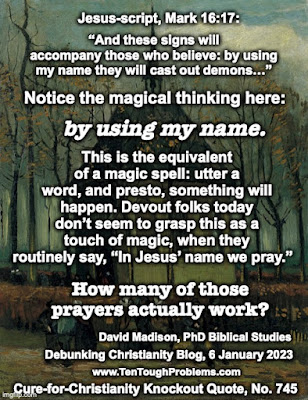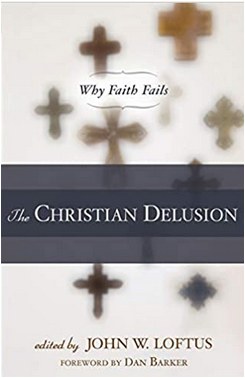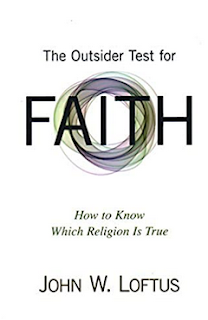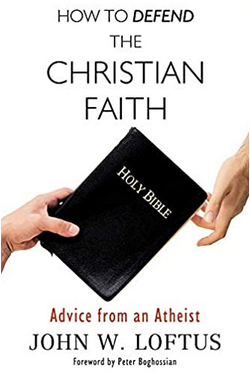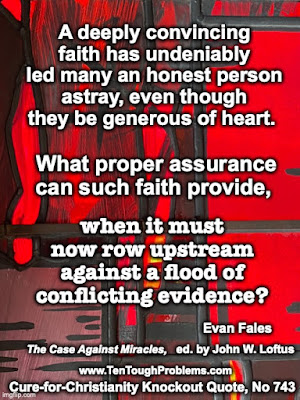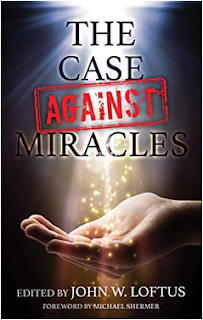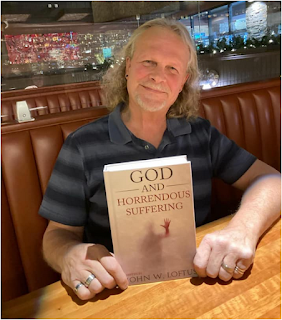I'm done writing and editing books, so I'm highlighting each one of them in thirteen separate posts. [See Tag Below]
God and Horrendous Suffering is the last book I wrote/edited. It was the last one I procured a contract for, the last one I submitted chapters for, and the last one shipped to buyers. It's published by the prestigious Global Center for Religious Research, whose President was Dr. Darren Slade. To get a copy of the hardcover or Kindle of this book click here. Other important links include a written debate I had on this issue with Don McIntosh at The Secular Web, plus a video on YouTube by Michael Maletin and narrated by Seth Andrews, plus the fantastic blurbs it has received.
Some of you have wondered when a paperback book will be available. It will probably be available sometime this year, 2025! It will contain an excellent new chapter by Dr. David Madison on World War I. It will include several revised chapters. I'm also hoping for an audio edition, but about that I don't know.
I'm extremely happy with the authors of this anthology and their chapters! Together we've made a difference. I could not have done this without them. I am deeply in their debt.
I'm thinking of a new order to the Contents, something like this:
Table of Contents:
Foreword, by Stephen Law
Introduction, by John Loftus
Part 1 Prolegomena to Horrendous Suffering
1. John W. Loftus, In Defense of Hitchens’s Razor
Part 2 Concrete Examples of Horrendous Suffering
2. Darren Slade, Failed to Death: Misotheism and Childhood Suffering
3. David Madison, World War I: Why Didn't It Put an End to Belief in God?
4. Vitaly Malkin, The Problem of the Jewish Holocaust
5. John W. Loftus, The Problem of Animal Suffering
Part 3 The Abject Failure of Theodicies
6. William Patterson, A Rawlsian Approach to Theodicy
7. N.N. Trakakis, Swinburne vs Swinburne
8. John Loftus, The Abject Failure of the God of Creation, Revelation, and Redemption
9. John Loftus, On Making Excuses for God
10. David Kyle Johnson, Refuting Skeptical Theism
Part 3 Theological and Religious Issues
11. John Loftus, The Awful Controlling Damning Lying Calvinist God
12. Gunther Laird, Dissolving the Thomistic Solution to Evil
13. Elicka Peterson Sparks, Christian Nationalism is Criminogenic
Part 4 Religious Issues
14. Jack David Eller, Pious Pain: Self-Harm as Religious Work and Religious Good
15. Mark Gura, On Falsifying Buddhism, Karma and Rebirth
16. Taner Edis, Doubt and Submission: Why Evil is a Minor Problem for Islam
Part 5 Biblical and Personal Issues
17. Dan Barker, Supernatural Evil
18. David Madison, Bible Horror Tales That’ll Chill You To the Bone
19. David Madison, The Bible Fails to Make Sense of Human Suffering
20. Dale W. O’Neal, The Making and Unmaking of a Christian Zealot
Book Title: My original suggested title was The Incompatibility of God and Horrendous Suffering. My publisher thought if we drop the first three words it might leave the reader wondering what we conclude, at least on first sight. As a result it would get their attention!

Book Cover: You can see me holding the hardback book above, but there were two other covers to choose from, both of which are possibilities for the 2nd edition.
Authors & Chapters: It was a pleasant surprise that Darren accepted my book proposal before I had many authors and specific chapters. He did so based on the quality of my earlier books That was nice! He offered the possibility for a call for papers, but I didn't need it.
Darren Slade: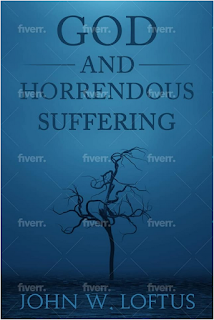 Dr. Slade is my friend and publisher. He was an absolute joy to work with and an expert at what he does. His chapter is the longest one in the book at about 16k words, or two chapters worth!
Dr. Slade is my friend and publisher. He was an absolute joy to work with and an expert at what he does. His chapter is the longest one in the book at about 16k words, or two chapters worth!
Vitaly Malkin: Malkin gave me permission to choose an excerpt from his excellent book, Dangerous Illusions for his chapter, The Problem of the Jewish Holocaust. So I did, making a few edits along the way. But when it came to finding the references for his quotes from his bibliography he didn't help at all. I did my best on them, even if it meant quoting from Wikipedia (sorry).
Mark Gura: My friend Mark can speak really well at events! From what I knew before I read the first drafts of his chapter, "On Falsifying Buddhism, Karma and Rebirth", he could also write really well! But you wouldn't know it from what I saw. He tried to cram way too much information into one chapter. He went through four different versions until he had it up to 12k words, and asked for more! I know that problem very well. What you'll find in the end result is his content filtered through my edits, as I selected from, re-arranged, and even re-wrote parts of his chapter for clarity, with his consent. It ended up at 7,775 words. I didn't add enough to be a co-author, but the time it took was the same as if I was. Together we made it into a wonderful piece! He has a book in him and I hope he writes it!
Gunther Laird: At the very last minute readers of this blog prodded me to have a chapter on the Thomistic solution to evil, with a critical eye on Catholic apologist Edward Feser's defense of it. Darren's knee-jerk reaction wasn't favorable in allowing it, but he turned right around and did so graciously. Gunther Laird obliged with his chapter. I'm happy about this, although it was surely the reason why the book came out about a month late.
Elicka Peterson Sparks: Sparks didn't have the time to choose an excerpt out of her book, The Devil You Know: The Surprising Link between Conservative Christianity and Crime, for publication. So I summarized her book in an excerpt of 8,000 words. See if you can do that with a book of her size! There are no footnotes in her chapter because one third of her book is in the footnotes! If I included the footnotes it would greatly enlarge her excerpt. You'll have to buy her book to get them, and I recommend you do. Later she copyedited and approved my excerpt. As an aside, I found her an excellent opening quote from Thomas Paine: “Belief in a cruel God makes a cruel man.”
Yes, folks, this is what it takes to be a good editor. I put this book together, dealt with the authors, the publisher, wrote the Introduction plus five chapters, and am promoting it. Doing an anthology of freshly written chapters is one of the most time consuming projects someone can do. This is the seventh time I did it! I've done enough for one person.
Finally, if you hear anyone saying, "if you read two or three of Loftus's books then you don't need to read any others", send them here to these thirteen posts, Tagged below. Each one of them has a different focus, with different content, and in the case of my anthologies, different authors. There's an encyclopedia in them thar pages!
--------------
John W. Loftus is a philosopher and counter-apologist credited with 13 critically acclaimed books.
Please support my work by sharing my posts, or by subscribing, donating, or buying my books at Amazon then telling others about them! As an Amazon Associate John earns a small amount of money from purchases made from Amazon. Buying anything through them helps fund my work here, and is greatly appreciated! Thanks for your support!
